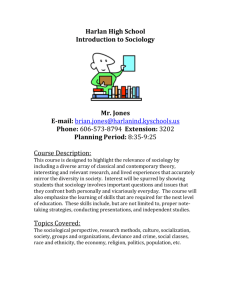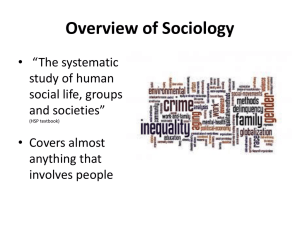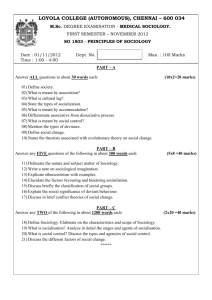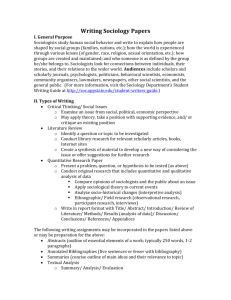SO100 - SharePoint
advertisement
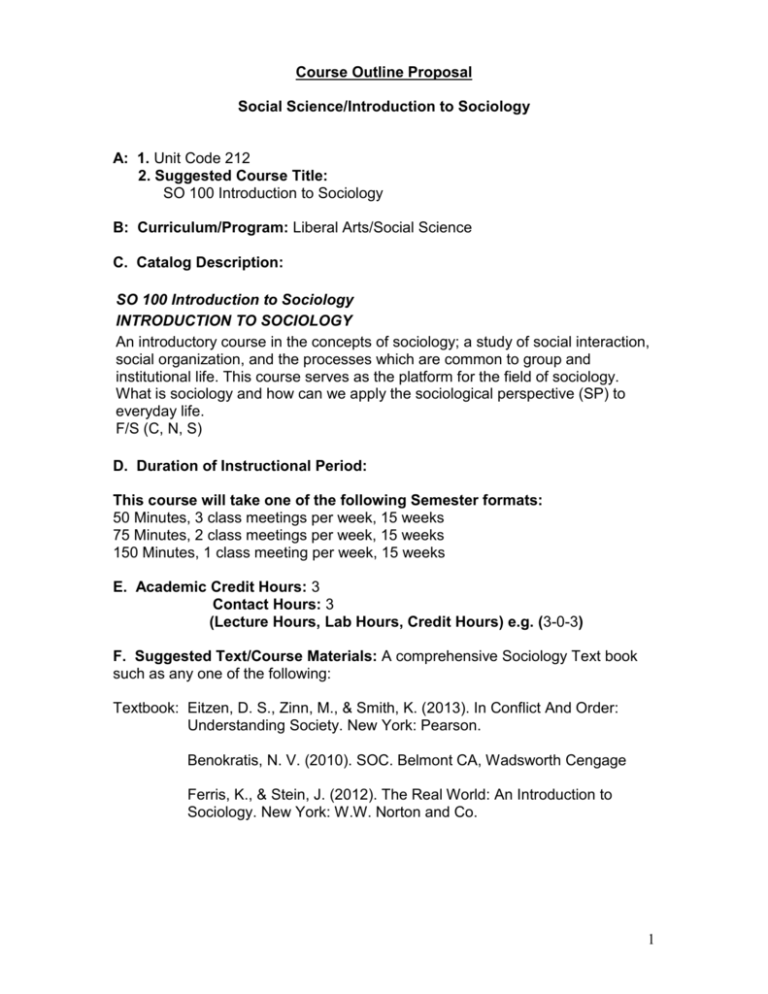
Course Outline Proposal Social Science/Introduction to Sociology A: 1. Unit Code 212 2. Suggested Course Title: SO 100 Introduction to Sociology B: Curriculum/Program: Liberal Arts/Social Science C. Catalog Description: SO 100 Introduction to Sociology INTRODUCTION TO SOCIOLOGY An introductory course in the concepts of sociology; a study of social interaction, social organization, and the processes which are common to group and institutional life. This course serves as the platform for the field of sociology. What is sociology and how can we apply the sociological perspective (SP) to everyday life. F/S (C, N, S) D. Duration of Instructional Period: This course will take one of the following Semester formats: 50 Minutes, 3 class meetings per week, 15 weeks 75 Minutes, 2 class meetings per week, 15 weeks 150 Minutes, 1 class meeting per week, 15 weeks E. Academic Credit Hours: 3 Contact Hours: 3 (Lecture Hours, Lab Hours, Credit Hours) e.g. (3-0-3) F. Suggested Text/Course Materials: A comprehensive Sociology Text book such as any one of the following: Textbook: Eitzen, D. S., Zinn, M., & Smith, K. (2013). In Conflict And Order: Understanding Society. New York: Pearson. Benokratis, N. V. (2010). SOC. Belmont CA, Wadsworth Cengage Ferris, K., & Stein, J. (2012). The Real World: An Introduction to Sociology. New York: W.W. Norton and Co. 1 G. Course Outcomes: UPON COMPLETION OF THIS COURSE, THE STUDENT WILL BE ABLE TO: COURSE OUTCOME NUMBER COURSE OUTCOME 01 Explain & Appraise: Sociology as a science and correct common misconceptions about the field 02 Describe and compare the scientific methods used in sociological research (evidenced-based-sociology) 03 Define, Name & Describe sociological terminology, recognize researchers/theorists who have shaped the field and current research (Emile Durkheim, Karl Marx, Max Weber) 04 Develop critical thinking skills and scientific literacy 05 Explain the basic concepts of social structure, social institutions, and cultural processes underling behavior 06 Name & Describe the basic concepts of social forces, social interaction, social groups, sociological thinking, intelligence, the sociological imagination, and the applied approaches to problemsolving and policy approaches to social problems. 07 Recognize and have an appreciation for the complexity and diversity of human-social behavior 08 Apply sociolgical concepts and findings to everyday life. H. Program Competencies: 1) Students will demonstrate understanding of the methods social scientists use to explore social phenomena, including sociological observation, hypothesis development, measurement and data collection, experimentation, evaluation of evidence, and employment of statistical and qualitative, interpretive analysis. 2) Students will demonstrate knowledge of major concepts, models and issues of at least one discipline in the social sciences (e.g., social psychology, historical sociology, political sociology). 2 I. SUNY General Education Ten Knowledge Areas: Social Science Knowledge Area SUNY KNOWLEDGE AREA (SOCIAL SCIENCE) LEARNING OUTCOME 01. Students will demonstrate: understanding of the methods social scientists use to explore social phenomena, including observation, hypothesis development, measurement and data collection, experimentation, evaluation of evidence, and employment of statistical and interpretive analysis; 02. Students will demonstrate: knowledge of major concepts, models and issues of at least one discipline in the social sciences. COURSE OUTCOME(S) RELATED TO SUNY KNOWLEDGE AREA LEARNING OUTCOME (1), (2), (3), (4), (8) (5), (6), (7) J. ECC Graduate Learning Outcomes (LO): ECC GRADUATE LEARNING OUTCOMES (LO) COURSE OUTCOME(S) RELATED TO GRADUATE LEARNING OUTCOMES (GLO) 2. Critical Analysis and Reasoning (2), (3), (4) 4. Scientific Reasoning (1), (5), (6), (7), (8) K. Student Learning: K1. Evaluation of Student Learning ASSESSMENT METHOD UTILIZED IN THIS COURSE (yes/no) Examinations Yes PERCENTAGE OF FINAL GRADE 50 - 100 Quizzes Yes 0 - 20 Written Assignments Yes Extra Credit 3 Reading Assignments Research Projects Yes 0 - 10 Yes 0 - 10 Yes Extra Credit Portfolios Oral Presentations Collaborative Assignments Article Analysis Capstone Activities Web- Based Assignment K2. Assessment of Student Learning ASSESSMENT METHOD Final Exam Survey UTILIZED IN THIS COURSE (yes/no) Yes L. Library Resources (suggested/optional): Library Resource Database: http://libguides.ecc.edu/dbs MySocLab: http://www.pearsonmylabandmastering.com/northamerica/mysoclab/ Aplia: https://www.aplia.com/ M. Topical Outline: INSTRUCTIONAL PERIOD (weeks/days) AMOUNT OF TIME SPENT ON TOPIC What is Sociology; Major Schools of thought and research methods 1 Wk – 2 Wks. 150 – 300 Min. Sociological Basis of Behavior-social groups, social interaction, social structure 1 – 2 Wks. 150 - 300 Min. SPECIFIC COURSE TOPIC 4 1 Wk. 150 Min. 1 Wk. 150 Min. 1 – 3 Wks. 150 – 450 Min. (4 – 7 Wks Total) 1 Wk. 1 – 3 Wks. 1 Wk. 600 – 1,150 Min. 1 Wk. 150 Min. 1Wk. 150 Min. 1 Wk. 150 Min. Culture: Socialization Social Control/Deviance Social Class, Social Stratification, Race, & Gender Optional Topics Economy & Polity Families, Education,& Religion Globalization: Economic & Demographic Population, Urbanization & the Environment 150 Min. 150 – 450 Min. 150 Min. Duality of Social Life: Functionalism/Order sociology & Conflict sociology Contemporary SociologyMcDonaldization of Society N: Proposal Prepared by: Social Sciences Sociology Faculty – Richard F. Mancuso, Derek Bateman Spring 2014 Semester 5





